American Library Association Midwinter conference (ALA Midwinter) was January 25-29, 2019 at the Seattle Convention Center. It was also my first library conference.
While I have been to fan conventions in the past, I was not sure what to expect from ALA. I had heard whisperings about the Expo Hall and more free books than you can carry (which proved true), but I was ultimately there to learn. Just hoping to get a sense of what is currently important to the library community at large, through the panels and presentations on offer.
I tried to balance both the Expo Hall and the sessions to the best of my ability. There are several takeaways, not only from the program itself, but also about the experience of the conference at large, and how to navigate it. I also came away from the experience knowing how to better budget my time and what to differently when I attend conferences in the future.
Symposium on the Future of Libraries
I went to several panels each day of the conference. There were many times where there were multiple panels of interest happening simultaneously, so I had to made some difficult choices about which ones I attended.
Ultimately, I focused on the intersection between librarianship and technology, as that is one of my research interests. I can’t cover them all here, but I’ve written about some of the most impactful or memorable panels I attended below.
Coincidentally, the majority of the panels were from the Symposium on the Future of Libraries. The Symposium was sponsored by The Center for the Future of Libraries and focused on “exploring the near-term trends already inspiring innovation in academic, public, school, and special libraries and the longer-term trends that will help us adapt to the needs of our communities.”
Metadata and Customization
One of the most thought-provoking panels was also one of the first I attended. It set the tone for much of what I thought about during the conference, and it helped contextualize other panels. It was called Meeting Patrons Where they Are – The Library’s New Place in the Digital World.
The presenter, Kathryn Harnish, discussed patron expectations from the library. For better or worse, patrons have grown accustomed to customized experiences in online spaces. Websites like Facebook and StitchFix utilize metadata provided by the user to tailor their experience, from the ads they see to the clothing they are recommended.
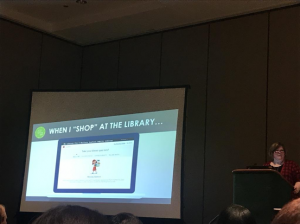
From Kathryn Harnish’s talk about library innovation
Libraries have a phenomenal quantity of metadata that they capture or could be capturing from their patrons. They could be leveraging that data in order to provide a fully-customized experience in the library.
Furthermore, library users may begin to expect libraries to offer this tailor-made experience, and libraries may be forced to adapt to those expectations or risk losing their users to other platforms. Those platforms may offer a customized experience, but won’t offer the plethora of free services that libraries do.
“We shouldn’t change what the library is doing, just how it is doing those things.”
It isn’t an unreasonable expectation, considering librarians have been offering in-person, tailor-made experiences for decades. From customized reading recommendations to in-depth, reference research help, the library already offers that personalized touch. We just need to take advantage of the data to further improve on those services, and figure out how to translate that to our digital spaces.
We also need to be transparent in how we want to use data, and maintain a human touch in all that we do. Transparency is necessary to maintain our relationships with our patrons and their trust in us as information professionals.
We shouldn’t change what the library is doing, just how it is doing those things. There are many barriers and challenges to making this work, but I thought Harnish proposed some thought-provoking ideas about user expectations and ways we can use metadata not just in cataloging and digitization of materials, but to help patrons, too.
Machine Learning and Bias

From Andromeda Yelton’s talk on Machine Learning
As I mentioned before, I saw this conversation about metadata bleed over into other areas of the conference. For instance in the Expo Hall, Gale demoed new software that would use encrypted user metadata about their behaviors to help better target users for relevant program marketing from the library.
I also went to a talk called Machine Learning: How Does It Work?! by Andromeda Yelton. She explained how machine learning is about getting computers to act without being explicitly programmed to do certain things, like differentiate what is or is not spam in your inbox.
She also talked about other practical applications for machine learning, as well as its potential drawbacks and flaws. For instance, machine learning can contribute to more extensive metadata and cataloging that we do not have the human staff to provide. However, machines are also particularly susceptible to adopting your biases, even if you don’t intend them to.
Related reading: Diversity, Inclusion & Bias in Artificial Intelligence
Disability Access in Libraries
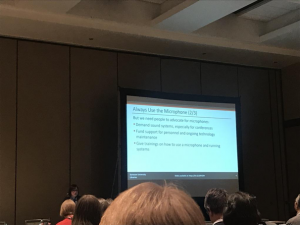
Kate Deibel’s talk on Accessibility in the Library
I also attended a talk by Syracuse’s own Kate Deibel, titled Pushing on the Frontier: Disability Access and the Future of Libraries. She discussed the importance of thinking about accessibility in its many forms, and fighting for access in your library.
She opened by asking the audience if she needed to use the microphone. The correct answer was yes, because even if you have a loud speaking voice, using the provided microphone makes your presentation more accessible, as it ensures that everyone can hear you. She also discussed working to ensure the Braille signage is correct in your library (which it very well may not be), as well as considering learning disabilities when designing or updating your website.
Her main point was that libraries should be equitable spaces, but people with disabilities have been often excluded from these conversations. This presentation did a great job at framing some of the key issues with disability access in librarianship today, as well as some proactive steps librarians can take to advocate for equitable library access.
It was a valuable discussion that I hope begins to permeate the greater conversation in the profession going forward.
Misinformation and its Malcontents
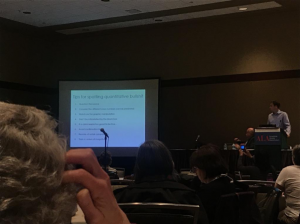
Jevin West’s portion of the talk addressing misinformation and information literacy
One of my favorite talks was called Misinformation and its Malcontents: University of Washington Research and Implications for Libraries. This talk featured three speakers that all addressed misinformation online, and how libraries can proactively work to combat misinformation and promote information literacy.
Much of the discussion focused on social media, and how difficult it is to fact check accounts that seem real and use a more human approach to spread misinformation by first establishing trust. Social media often allows manipulation to go unchecked, and the platforms should disentangle fake accounts from the real, but that is growing more difficult the better people get at manipulating our emotions and faking genuineness. It is up to us to question people that we don’t know, even if they seem real, because they may just be appealing to our emotions in order to establish trust.
Related reading: Social Media and Misinformation: An Interview with Jeff Hemsley
The presentation also included a discussion about libraries as spaces for social discourse, like public debates, hosting informed speakers on topics relevant to the community, and staying agile by adjusting programming and materials for community needs.
It ended with a call to action for information literacy, and that data reasoning is as important as critical reasoning. Numbers seem to carry more authority than words because they feel more objective, but they are not. We need to learn how to best navigate the information hubs we have grown to rely on, especially since they are potentially addictive and often insincere.
The Expo Hall
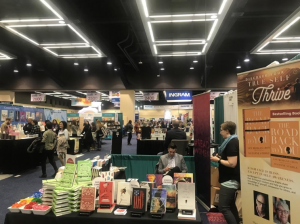
The Expo Hall
Honestly, the Expo Hall is overwhelming. There are rows and rows of booths full of people that want your attention. And as a poor graduate student, I am automatically drawn to anything that is free.
Related reading: Funding, Please! Attending LIS Conferences on a Grad Student Budget
However, there are more free books on offer than anyone can feasibly bring home. Yes, you can ship books to yourself directly from the Expo Hall, but even then, there’s still too much. I said yes to a lot of books on the first day, but I would do things differently the next time.
I suggest scoping out the halls first. If you see anything that really strikes you, by all means pick it up. But, if you’re feeling sensory overload like I was, take stock of everything on offer, and go back for the things that really appeal to you. I ended up coming home with this stack, which is pretty modest in comparison to what I could have ended up with (and what others certainly did).
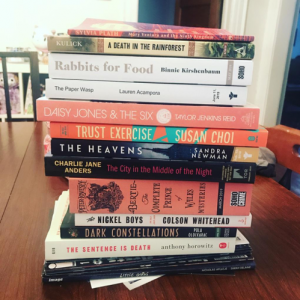
Books Acquired from the ALA
Keep in mind that booths will also give out free t-shirts, candy, pins, tote bags and pens, as well as host giveaways. There is a lot to wade through. Leave a little (or a lot of) extra room in your suitcase when you’re preparing for the conference, be strategic about what you take, and don’t be afraid to say no.
The Expo Hall was also a great place for seeing demos of new and exciting products for libraries, like the one from Gale I mentioned earlier, and networking. I had a long conversation about mentorship and professional development at the Library Juice table.
For future ALA goers, I would recommend you reserve a lot of time to make your way through the Expo Hall, but to avoid the mad dash inside on the first night. There will be plenty of books, demos, and people waiting for you for the duration of the weekend.
In Conclusion
I think ALA Midwinter was a great first conference. It gave me the opportunity to visit a city I had never been to before, featured a lot of interesting discussions, and gave me a taste for what it is like for information professionals to network, work on professional development, and learn about new books to offer to their patrons. While hectic, I loved how many people in the Expo Hall got as excited about new books as I did.
I learned a lot about technology, information literacy, and potential future paths libraries may take. I also feel better prepared for my next conference, which I hope isn’t too far off.
